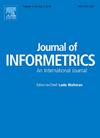Study on the predictability of new topics of scholars: A machine learning-based approach using knowledge networks
IF 3.4
2区 管理学
Q2 COMPUTER SCIENCE, INTERDISCIPLINARY APPLICATIONS
引用次数: 0
Abstract
Scholars continuously explore new research topics to drive personal academic achievements. While factors influencing topic selection exist, the predictability of scholars’ choices regarding new topics is not yet fully understood. To bridge the gap, this study investigates the predictability of new topics of scholars (NTS). The research task is transformed into a binary classification, predicting whether NTS that appear in the disciplinary knowledge network will be adopted by a scholar in the future. Using PubMed Knowledge Graph (PKG) as the data source, over 17,000 local knowledge networks (LKNs) of individual scholars are constructed, along with a global knowledge network (GKN) of all the scholars in the database. Sixteen features of knowledge network topology and candidate topics are extracted, and seven machine learning algorithms are applied. Our large-scale experiments show that the best prediction model achieves an F1 score of 86.49%. Shapley values provide more interpretable results. A 1-year observation window appears to be sufficient for making predictions. Novel topics and young scholars exhibit good predictability. Our findings provide profound insights into the predictability of scholars' topic selection and offer practical implications for future in-depth studies.
求助全文
约1分钟内获得全文
求助全文
来源期刊

Journal of Informetrics
Social Sciences-Library and Information Sciences
CiteScore
6.40
自引率
16.20%
发文量
95
期刊介绍:
Journal of Informetrics (JOI) publishes rigorous high-quality research on quantitative aspects of information science. The main focus of the journal is on topics in bibliometrics, scientometrics, webometrics, patentometrics, altmetrics and research evaluation. Contributions studying informetric problems using methods from other quantitative fields, such as mathematics, statistics, computer science, economics and econometrics, and network science, are especially encouraged. JOI publishes both theoretical and empirical work. In general, case studies, for instance a bibliometric analysis focusing on a specific research field or a specific country, are not considered suitable for publication in JOI, unless they contain innovative methodological elements.
 求助内容:
求助内容: 应助结果提醒方式:
应助结果提醒方式:


